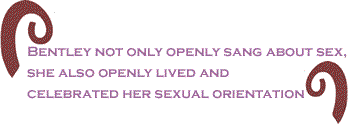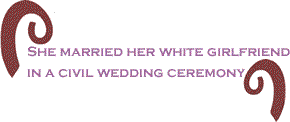
|
||||||||||||||||||||||
|
||||
 |
||||
In celebrating Black History Month, I want to personally celebrate the courage and strength of sistah-warrior Gladys Bentley (1907-1960).
Her fall from the entertainment spotlight, however, is a cautionary tale about what can happen to us during a repressive political era when both church and state are our enemies. A talented pianist and blues singer, and one of the most notorious and successful entertainers during the Harlem Renaissance, Bentley cultivated a large LGBTQ following up until the 1950s. And as an African-American woman whose success derived from her raunchy and salacious lyrics to popular tunes, Bentley not only openly sang about sex, she also openly lived and celebrated her sexual orientation as an out lesbian. �It seems I was born different. At least, I always thought so,� Bentley told Ebony Magazine back in the �50s. From the time I can remember anything, even as I was toddling, I never wanted a man to touch me. Soon I began to feel more comfortable in boys� clothes than in dresses.� Known to perform in her infamous white tuxedo and top hat, Bentley�s gender-bending would label her by today�s queer lexicon as a �stone butch.� But in black queer parlance of that era, she was a �bulldagger.� And the police constantly harassed her for wearing men�s clothing. By the �50s, the country was on a campaign to restore traditional gender roles that were disrupted by W.W. II, and McCarthyism was its policing mechanism. Special attention, however, was given to LGBTQ people.
The
McCarthy witch-hunt had a small impact on the black community overall.
But the two most noted during this era were W.E.B. Dubois and Paul
Robeson. W.E.B. Dubois was the target of red-baiting by the HUAC
because he chaired the With the absence of 16 million men, predominately white, in the workforce, women, and ethnic and queer minorities filled those vacancies. Women of the time not only transgressed traditional career opportunities, but also traditional dress codes. Women wearing pants to work and on the street, and their availability to purchase pants in department stories, gave women in the �40s and �50s the freedom to dress down and still be viewed as acceptable. For gender-bending lesbians like Bentley, the wearing of pants - usually confined to the privacy of their home, lesbian bars and on the performance stage - was a welcomed freedom. However, without the consent of the time, except in the private and acceptable spaces where pants were permissible, Bentley had worn pants since the �20s. As troubling as that was, especially given her public lesbianism, Bentley accosted the sanctity of marriage with her active participation in this country�s racial and gender obsession - interracial marriage. Had her �woman-friend� been African-American, their coupling would have clearly been subjected to condemnation and jeering, but their same-gender loving relationship would not have conjured up the wrath, fear and disgust that interracial marriage did. With anti-miscegenation laws operating in all states until 1967, and with LGBTQ people today being denied both the right of both state and church weddings, Bentley single-handedly performed a coup d�etat against the institution of marriage and the prohibition against miscegenation. She married her white girlfriend in a civil wedding ceremony. To
punish her, the forces of McCarthyism and the The
With
the church�s belief in a heterosexual paradigm as the model to showcase
black humanity in order to win God-given civil rights, the dynamic
between the black press and the The cautionary tale here is that it is not so different today. BlackCommentator.com Editorial Board member, the Rev. Irene Monroe, is a religion columnist, theologian, and public speaker. She is the Coordinator of the African American Roundtable of the Center for Lesbian and Gay Studies in Religion and Ministry (CLGS) at the Pacific School of Religion. A native of Brooklyn, Rev. Monroe is a graduate from Wellesley College and Union Theological Seminary at Columbia University, and served as a pastor at an African-American church before coming to Harvard Divinity School for her doctorate as a Ford Fellow. She was recently named to MSNBC�s list of 10 Black Women You Should Know. Reverend Monroe is the author of Let Your Light Shine Like a Rainbow Always: Meditations on Bible Prayers for Not-So-Everyday Moments. As an African American feminist theologian, she speaks for a sector of society that is frequently invisible. Her website is irenemonroe.com. Click here to contact the Rev. Monroe. |
||||
 |
||||
If you would like to comment on this article, please do so below. There is a 400 character limit. You do not need a FaceBook account. Your comment will be posted here on BC instantly. Thanks. Entering your email address is not mandatory. You may also choose to enter only your first name and your location.
|
||||
Thank you very much for your readership. |
||||
| Any BlackCommentator.com article may be re-printed so long as it is re-printed in its entirety and full credit given to the author and www.BlackCommentator.com. If the re-print is on the Internet we additionally request a link back to the original piece on our Website. | ||||
| |
||||
Issue 362 |
| Executive Editor: Bill Fletcher, Jr. |
| Managing Editor: Nancy Littlefield |
| Publisher: Peter Gamble |
| Est. April 5, 2002 |
| Printer Friendly Version in resizeable plain text format |
 |
 |
 |

|
 |
| |
| |

































 In
February of 1950 McCarthy captured the nation�s attention with its
anti-communist propaganda that the State Department was riddled
with card-carrying members of the Communist party. Just two years
prior, in 1948, the House of Un-American Activities Committee (HUAC)
had its most infamous case: the indictment of Alger Hiss. With the
passing of the McCarran Act in 1950 all noted communists were registered
as foreign agents, denied passports, and excluded from employment
in both the government and in the defense industry. The witch-hunting
did not only targeted real and imagined communists, it also targeted
the nation�s LGBTQ population with a vengeance. After the 1948 Kinsey
Report titled �Sexual Behavior in the Human Male,� which reported
that 37% of American males had at least one gay sexual experience
to the point of orgasm, the gay male population was now red-baited.
Thought to be security risks queers were barred from all branches
of the military, and civil service, and they were a constant target
of not only police harassment but also of countless arrest in gay
bar raids. Harry Hay, founder of the gay male activist organization
called the Mattachine Society, was not only forced to abdicate his
position as president, he also had to leave the group entirely because
of his supposedly communist past.
In
February of 1950 McCarthy captured the nation�s attention with its
anti-communist propaganda that the State Department was riddled
with card-carrying members of the Communist party. Just two years
prior, in 1948, the House of Un-American Activities Committee (HUAC)
had its most infamous case: the indictment of Alger Hiss. With the
passing of the McCarran Act in 1950 all noted communists were registered
as foreign agents, denied passports, and excluded from employment
in both the government and in the defense industry. The witch-hunting
did not only targeted real and imagined communists, it also targeted
the nation�s LGBTQ population with a vengeance. After the 1948 Kinsey
Report titled �Sexual Behavior in the Human Male,� which reported
that 37% of American males had at least one gay sexual experience
to the point of orgasm, the gay male population was now red-baited.
Thought to be security risks queers were barred from all branches
of the military, and civil service, and they were a constant target
of not only police harassment but also of countless arrest in gay
bar raids. Harry Hay, founder of the gay male activist organization
called the Mattachine Society, was not only forced to abdicate his
position as president, he also had to leave the group entirely because
of his supposedly communist past.
 For
supposedly taking female hormones to cure her of her lesbianism,
Bentley wrote an article for Ebony Magazine proclaiming, �I am woman
again!�
For
supposedly taking female hormones to cure her of her lesbianism,
Bentley wrote an article for Ebony Magazine proclaiming, �I am woman
again!�








